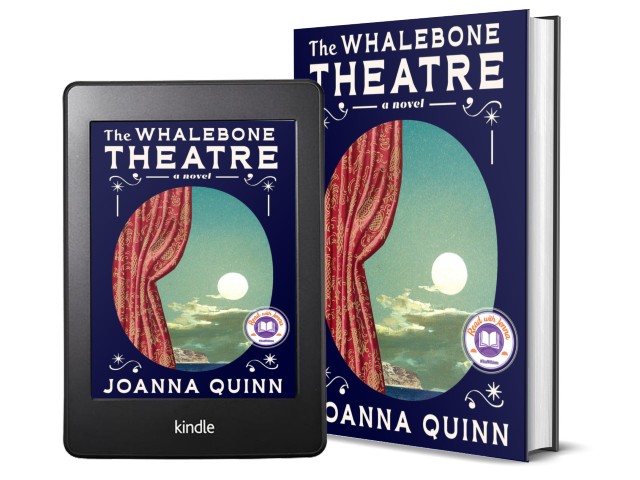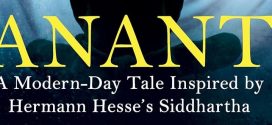The readers of historical fiction have been enjoying an influx of books featuring war heroines from World Wars I and II and applauding for adventures that have not been as widely appreciated in their own time. But now, with the sensibilities of the modern world telling these stories, we look at the times that is a hundred years in the past and find threads of countless lives, while also exploring the side-by-side existence of patriotism with internal conflicts of race, colour, creed and sexes that most of the countries went through internally.
| Book Title | : | The Whalebone Theatre |
| Author | : | Joanna Quinn |
| Published by | : |
Knopf ( V4 October 2022) Penguin ( 9 June 2022) |
| # of Pages | : | 864 (Paperback) 540; 4576 KB (Kindle EBook) 576 (Hardcover) 1175 Minutes (Audiobook) |
| # of Chapters | : | 5 |
| Purchase Link(s) | : |
|
There is a debut novel from Joanna Quinn, called The Whalebone Theatre that also tells us of lives in that era but on a much wider canvas than the war. Spanning over 600 pages, this can be seen as a massive venture for a first book, but it is a delightful reading experience and here are my thoughts on this book for Team Thinkerviews.
This Is Here In For You
Book Cover:
Let us take a look at the cover page of this book.

The Whalebone Theatre by Joanna Quinn | Book Cover
The early edition of this paperback book has a black background with a rich curtain showing us a glimpse of turquoise sky and the world underneath it.
Not a standout coverpage for the browsers..
Storyline:
Three year old Cristabel Seagrave discovers that snow doesn’t really test like anything, just as she is about to meet her stepmother for the first time. As Rosalind and Jasper Seagrave come to Chilcombe Manor after their wedding, we meet them and rest of the inhabitants and see this little world. As the primary purpose of the new union is to get an heir for the estate, Cristabel learns to live with anticipation of a brother that will now arrive any day. The first to arrive is Florence though, or ‘The Veg’ as Rosalind finds her first child to be very unattractive.
Then Jasper passes away and his brother Willoughby takes his place and marries Rosalind and they have a son, Digby. And so for all intents and purposes, the trio grow up as true siblings would and make their own education and their own play in the house and in the woods and beach around it, while the adults are too self-absorbed. When Cristabel is 11, a giant whale is washed ashore, and the children claim it as their own. Eventually, they make a place of play within its skeleton, acting out mot popular of the works of Shakespeare.
The theatrical production is made possible through Rosalind’s talents as a hostess and artistic help from bohemian visitors including Russian painter Taras and his brood of savage children.
But inevitably, the children grow up and the theatre where they end up is the second World War. As neither of them could escape their destined part in it, they also all invariably choose differently. As losses and pains roll in, what will be left for these young people in the aftermath of the lost world?
Views and Reviews:
I think one of the very first tugs that Cristabel has on the reader’s heart is when she remarks how there were no interesting girls in any of the books in her father’s library. This sentiment is understandable once you take a look at the library of a Victorian estate, filled with classics – mostly featuring adventuring heroes while their womenfolk waited on…Then there is the wait for the brother and how the arrival of Florence inspires following thoughts:
Surely sisters must be beneficial in some way. They know how to do weaving and how to cook simple warming fare. Sometimes they look after aged parents, when everyone else has left. Sometimes they are chained to rocks and offered up as sacrifice. She could probably find a use for that sort of thing.
And in complete contrast with the musings of a child growing up are the thoughts of her stepmother Rosalind – an adult who seem to follow the path that’s laid out for her and feels mostly lost:
Her life seems an endless succession of Sundays: clock-marked, rule-bound days of manners and luncheons. How thrilling to discover that the rigid particularity of things – fish knives, tablecloths, topics of conversation – is as arbitrary as deciding that one day should be called Sunday and treated differently to all the rest. If Sunday is only Sunday because we call it Sunday, then why not call it Friday instead?
The first part of the book shows us all the quirks and frivolities of the rich and the whimsies of the artistic bohemian set, while the servant around them carries on an endless cycle of chores. Even during wartime, speakeasies provide musical escape, while a bomb could tumble down the air shaft and end it all any minute:
It was as if they had gathered together to reassure each other they were the beating heart of everything, but then had a terrible feeling that they weren’t, so kept doing noisy, careless things to cover up the gaping hole in the middle of it all.
There is more to life than being looked at. Vanity is a small box of mirrors.
In Cristabel’s eclectic childhood activities, comes in the giant whale that eventually becomes the theatre for the display of their creative energies. The author does a fantastic job of building up the spaces:
When Cristabel walks through the jawbones, she remembers the whales’ downturned mouth, its vulnerable eye. When she stands in its rib cage, she recalls how she had one placed her hands on the outside of its body, and now she is inside its body, in the space created by its absent life. When she looks up, she sees the bones arching over her head against the vast starry sky like roof beams, like the skeletal beginnings of a strange new home. Something he has made from what was washed up, unwanted; something created from what was left to her.
And so Cristabel grows up to be a young lady with independent mind who would not be considered suitable for marriage. But then world war II arrives and changes the course of her life. As she joins the armed forces and works with men, always being made aware of being a woman, we see that what most adults want is an ability to make their own choices:
She realizes that, for all she resents the unfair advantages given to the opposite sex, she does not want to be a man, she only wants it not to matter that she is a woman. She wants this. This friendship, this acceptance. To be valued for what she can do, rather than told what she can’t.
Part 2 of the book takes us on the journey of the war and how it changes the course of lives for all three siblings, while their parents leave the stage. Florence finds the quiet strength to grow veggies, fall in love with the German prisoner past the prejudices of the war and then letting him go, keep the estate going, start a business and eventually find another love that will last past the war.
Cristabel finds the courage of facing the unknown, the brother she almost lost, the fragility of loving someone without conventions and coming back to find her place at home after she loses the person dearest to her on this earth. And Digby, finds himself, his sensitivities and the ability to look at the small injustices of a war that devours the sacrifices of so many:
War might depend on people who don’t flinch, but humanity rather relies on those who do.
How does it become normal for death to fly over your head? How does it become normal to carry on if it were normal?
Flossie finds that letting go of wishes is not always a relief, more a parting. The wish still exists, it has simply taken another road.
As I mentioned before, the book is quite long and covers a lot of ground. It would have been an enjoyable book even without the war years. In fact, the coming-of-age story could have been even more subtly impactful without the war. The transformation of the theatre loving trio into war veterans is a bit too quick and bit too much at times.
But the prose is beautiful, and the author mixes it up with variety of narrators, tone, diary entries, notes, letters and a lot more. The characters are all very well done and in fact so beautifully detailed that at one point or another, the reader’s heart will break for each and every one of them as life will shatter their little secure worlds and they will go through that door to the pains of facing a very different reality. The ending leaves you with a powerful reminder of love and how it is as much about the person who loves as the object of the love.
Summary:
An enjoyable story of the past, told with the modern sensibility, that combines the love of theatre and the excitement of venturing into unknowns.
ThinkerViews Rating:
Around 7.5 stars out of 10.
Quick Purchase Links:
- Buy - The Whalebone Theatre by Joanna Quinn - Paperback - Amazon IN
- Buy - The Whalebone Theatre by Joanna Quinn - Kindle EBook - Amazon IN
- Buy - The Whalebone Theatre by Joanna Quinn - Audiobook - Amazon IN
- Buy - The Whalebone Theatre by Joanna Quinn - Paperback - Amazon US
- Buy - The Whalebone Theatre by Joanna Quinn - Kindle EBook - Amazon US
Over To You:
If you already have read the book do share your remarks and thoughts via comments below. Does this review help you in making your decision to buy or read the book? Do not forget to share this article with your friends over various social networks. Please follow/subscribe us on various Social networks like Twitter, Facebook, YouTube, Spotify, Amazon Prime Music, Audible, and others. And yes, you may like to subscribe to our RSS feeds to get latest updates for the site to land right in your mail box.
 ThinkerViews – Views And Reviews Personal views and reviews for books, magazines, tv serials, movies, websites, technical stuff and more.
ThinkerViews – Views And Reviews Personal views and reviews for books, magazines, tv serials, movies, websites, technical stuff and more.



